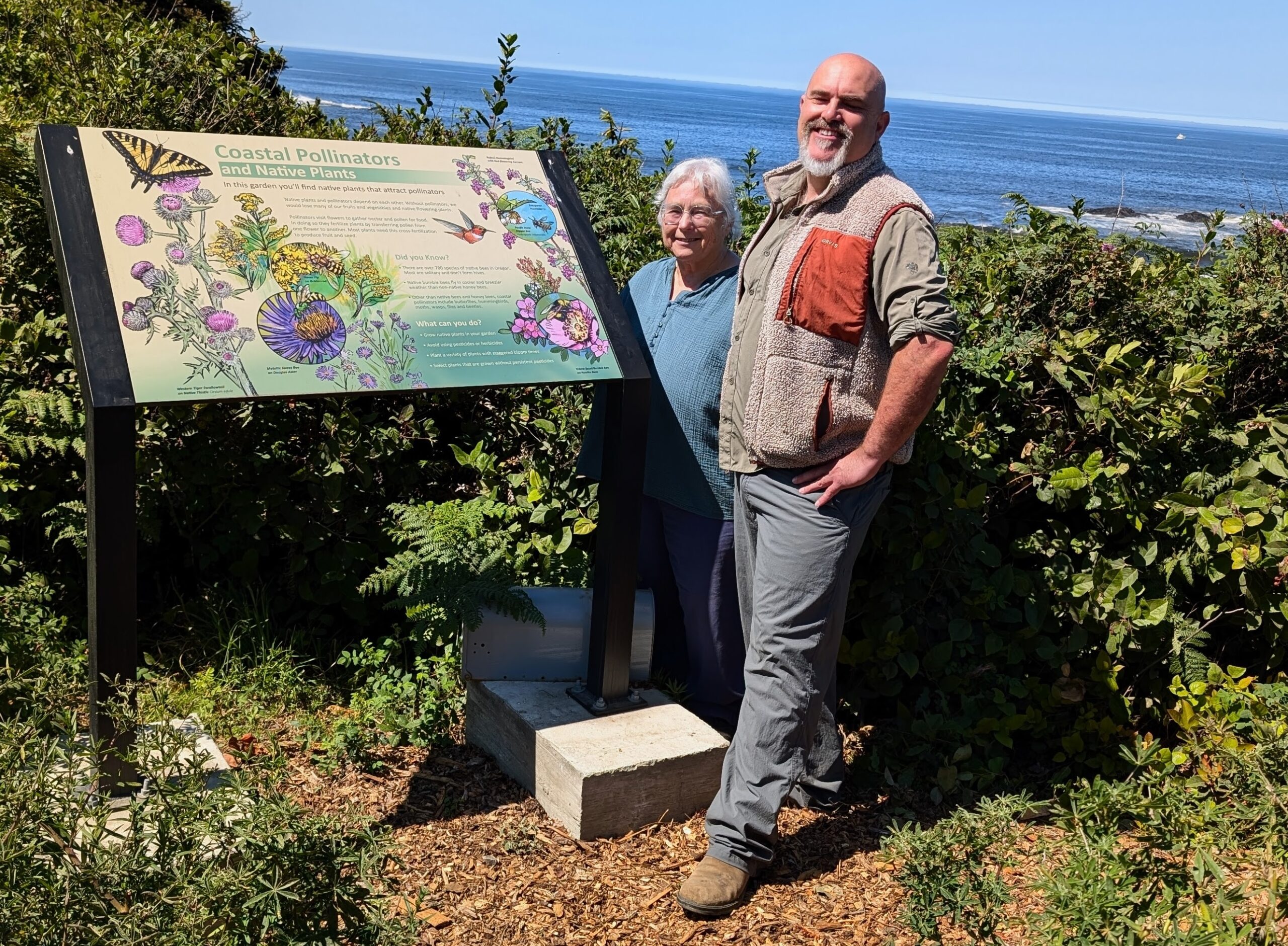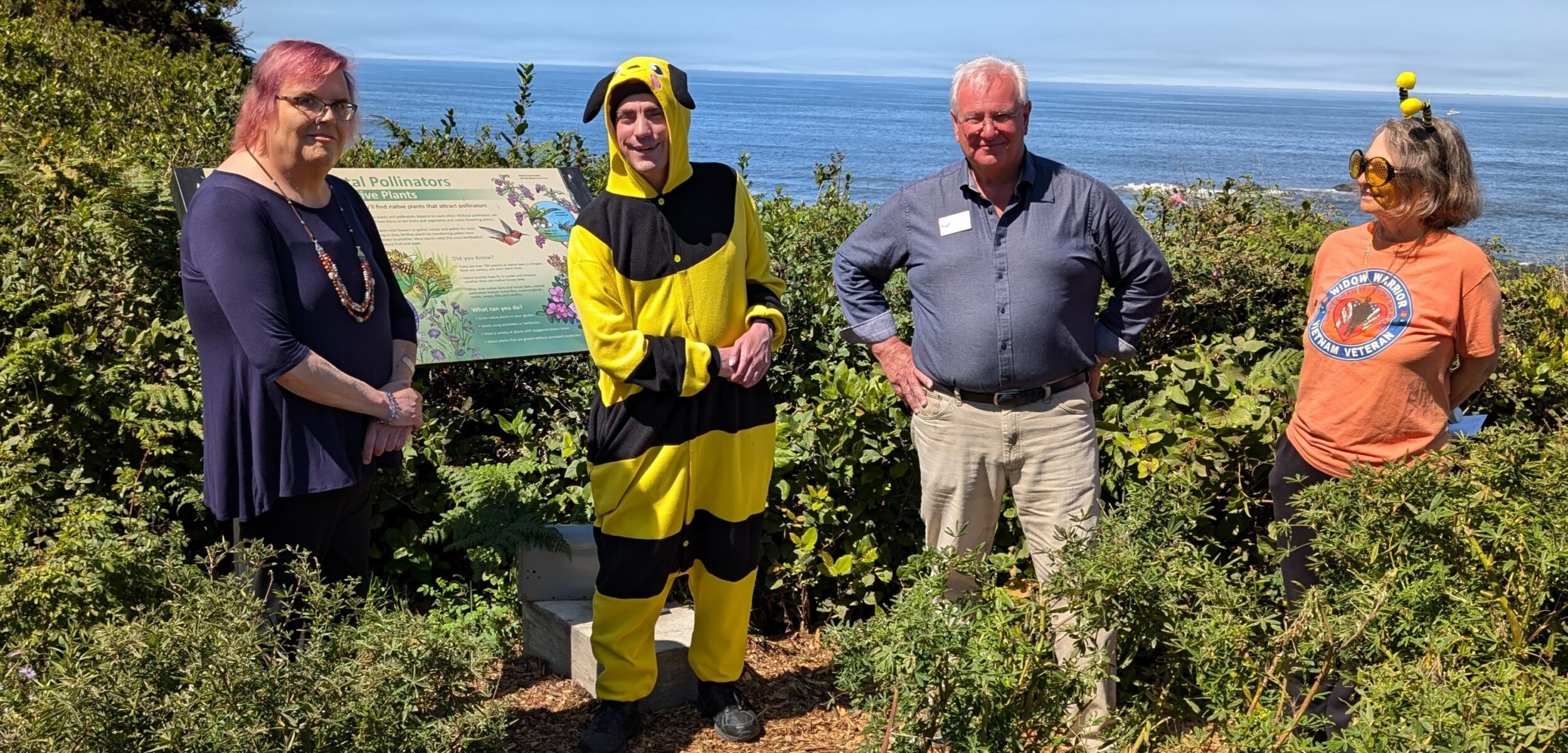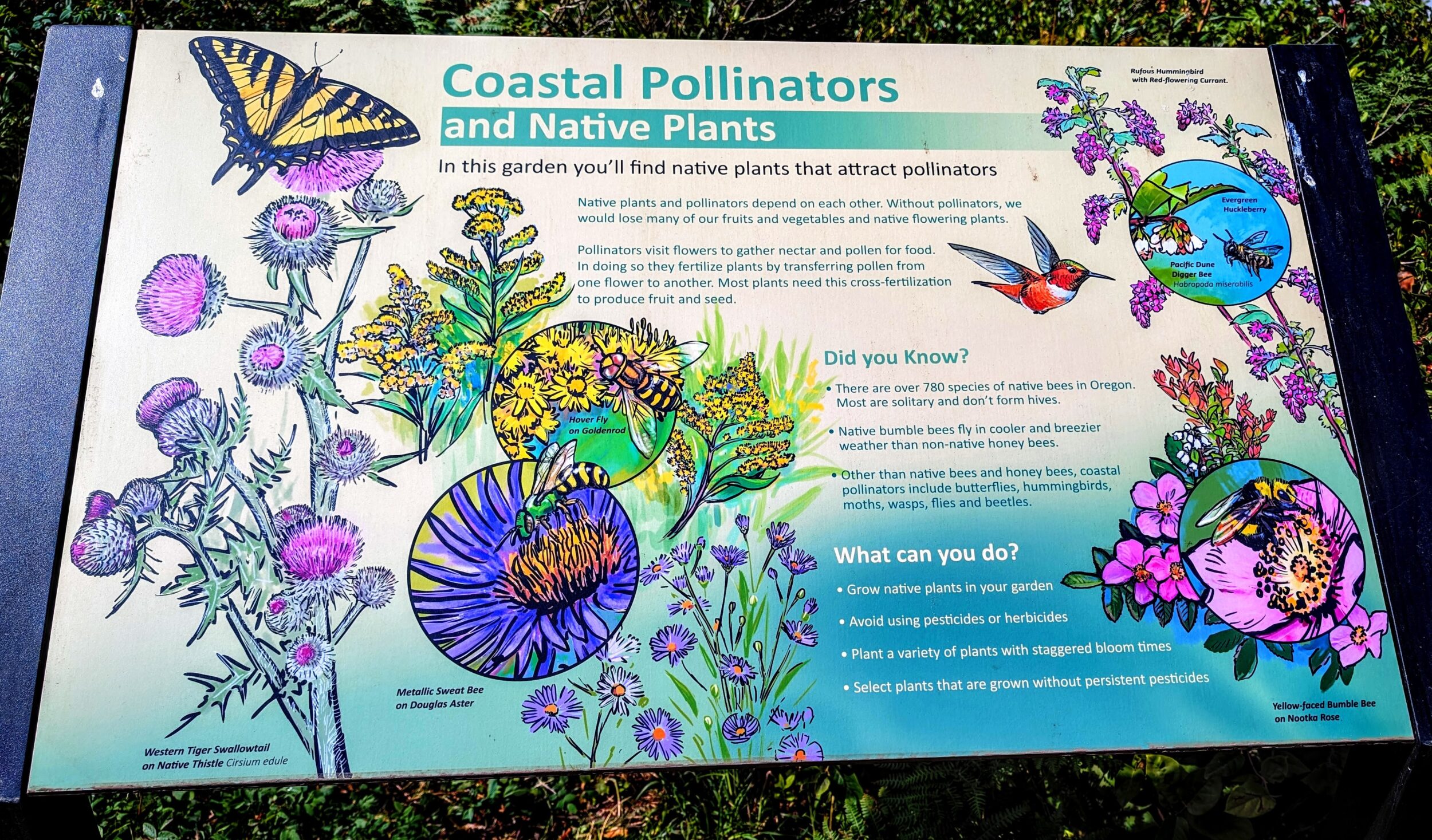
By CHERYL ROMANO/YachatsNews
If you like to eat, thank a bee. Or a butterfly. Or a hummingbird. And also thank a local volunteer group that’s building awareness of these critters as vital aids to humans’ food supply.
The Waldport-based Highway 101 Pollinator Project has created a stretch of U.S. Highway 101 unique in all of Oregon. The 25 miles from Newport to the Lane County line south of Yachats is the only corridor in the state where herbicides are not sprayed by the Oregon Department of Transportation. Project volunteers step up regularly to manually remove invasive plants like Scotch broom, while planting native shrubs and flowering perennials.
Why all the fuss?
Because, according to the U.S. Department of Agriculture “about 35 percent of the world’s food crops depend on animal pollinators to reproduce.” And without the birds, bees and other animals reproducing, and then depositing pollen from flower to flower so the plants can reproduce — there goes a chunk of the food supply.
“We know that we’re just a tiny corner of the world,” says Maxine Centala of Seal Rock, leader of the Highway 101 group. “But we’re doing what we can to help our native pollinators by supporting native plants.”

New Seal Rock sign
That support was recognized last week with a ceremony dedicating a new interpretive sign about pollinators. On hand were members of the pollinator group including former Yachats mayor Gerald Stanley, and Rep. David Gomberg, D-Otis, Lincoln County Commissioner Claire Hall, Waldport councilor Susan Woodruff and the team from Angell Job Corps that erected the sign.
“The sign will educate anyone who stops and looks about the importance of pollinators on the Oregon coast,” said Centala, a longtime gardener who has lived in Seal Rock for 23 years.
“This is a great celebration,” said Stanley at the dedication of the interpretive sign, which sits at the end of the southernmost highway turnout on Highway 101 in Seal Rock, near Northwest Coast Road. “It shows the power of citizens when they get support from leaders to move ahead.”
Key leadership roles in making the project reality were carried out by Hall and Gomberg. Hall has advocated for the pollinator group since Centala approached her 18 years ago. Gomberg was at one time the chair of the legislative committee that decided ODOT’s budget. And it was necessary to get ODOT’s consent to stop herbicide spraying.
“When good people step up, they can make remarkable things happen,” said Gomberg.

Citizens, officials against herbicides
The project’s roots stretch back to 2005 when area residents began lobbying against ODOT’s herbicide applications along Highway 101 in Lincoln County. Under the leadership of Centala, Diana Purdy of Seal Rock and Tom Kerns of Yachats, the pollinators enlisted support from local elected officials to plead their case to the governor’s natural resources policy adviser.
Two years later a 25-mile no-spray corridor was designated as a pilot project. But the work didn’t end there. Every year or two, Pollinator Project volunteers had to re-ask ODOT to keep the corridor herbicide-free. In the meantime, invasive weeds like tansy ragwort and Scotch broom began to thrive, so volunteers committed to removing large infestations by hand.
Ten years later, ODOT wanted to end the project, Centala said, “because they said pilot projects never last more than 10 years.”
That sent the group back to county commissioners, the ODOT director and local mayors. The result? A “yes” to ODOT agreeing to a no-spray corridor and allowing the volunteers to plant at 19 small sites along the 25-mile stretch.
The new interpretive sign designed by artist Ram Papish notes the importance of pollinators to the food supply. On the central coast, these plant helpers include native bumblebees and honeybees, butterflies, hummingbirds, moths, wasps, flies and beetles. At last week’s ceremony, Centala dedicated the sign to the memory of Robert Purdy, a former volunteer who died in March.
While the no-spray corridor may be a boon to pollinators and native plants, it does come at a financial cost, according to ODOT.
“ODOT views this corridor as a valuable opportunity to partner with Lincoln County,” District 4 manager Brian Morey said in an email to YachatsNews.com.
Still, withholding herbicides on the 25-mile stretch “requires additional mowing, brush cutting, and ditch cleaning,” he said. These additional tasks have increased the maintenance cost of the corridor by 22 percent, Morey said, compared with other portions of Highway 101 where herbicide is used.
ODOT is required by law to manage “noxious weeds such as blackberries, knapweeds and Scotch broom,” Morey said. “These plants provide pollinator benefits, but their removal serves the public good.”
Helping serve that public good are the dozen or so active volunteers in the Highway 101 Pollinator Project. More volunteers are invited to join in for fall planting, spring weeding and summer watering. People interested may contact Centala at 541-563-3651.
The project helps spread word of its work by appearing at local famers markets and special events. The group meets at 11 a.m. on the last Saturday of each month at the Waldport Library and anyone interested in helping is welcome to attend.
- Cheryl Romano is a Yachats freelance reporter who contributes regularly to YachatsNews.com. She can be reached at Wordsell@gmail.com


